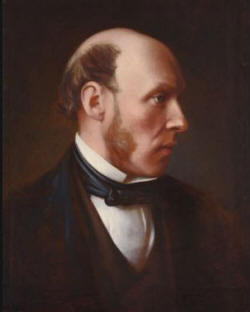

Queer Places:
University of Cambridge, 4 Mill Ln, Cambridge CB2 1RZ
30-32 Heaton Ln, Stockport SK4 1AR, UK
St. Bega's Churchyard
Bassenthwaite, Allerdale Borough, Cumbria, England
 James Spedding (26 June 1808 – 9 March 1881) was an English author, chiefly known as the editor of the works of
Francis Bacon. He was part of the
Cambridge Apostles.
Arthur Hallam and
Alfred Tennyson became friends in April 1829. Both joined the
Cambridge Apostles, which met every Saturday night during term to discuss,
over coffee and anchovy sandwiches, serious questions of religion, literature
and society.
Meetings of the Apostles were not always so intimidating:
Desmond MacCarthy
gave an account of Hallam and Tennyson at one meeting lying on the ground in
order to laugh less painfully, when James Spedding imitated the sun going
behind a cloud and coming out again.
James Spedding (26 June 1808 – 9 March 1881) was an English author, chiefly known as the editor of the works of
Francis Bacon. He was part of the
Cambridge Apostles.
Arthur Hallam and
Alfred Tennyson became friends in April 1829. Both joined the
Cambridge Apostles, which met every Saturday night during term to discuss,
over coffee and anchovy sandwiches, serious questions of religion, literature
and society.
Meetings of the Apostles were not always so intimidating:
Desmond MacCarthy
gave an account of Hallam and Tennyson at one meeting lying on the ground in
order to laugh less painfully, when James Spedding imitated the sun going
behind a cloud and coming out again.
James Spedding was born in Cumberland, the third and last surviving son of James Spedding, a country squire, and his wife Sarah. He was educated at Bury St Edmunds and Trinity College, Cambridge;[1] where he took a second class degree in the classical tripos, was a Cambridge Apostle, and was junior optime in mathematics in 1831. In 1835 he entered the Colonial Office, but he resigned this post in 1841. In 1842 he was secretary to Lord Ashburton on his American mission, and in 1855 he became secretary to the Civil Service Commission; but from 1841 onwards he was constantly occupied in his researches into Bacon's life and philosophy. Spedding's major edition of Bacon's works was begun in 1847 in collaboration with Robert Leslie Ellis and Douglas Denon Heath. In 1853 Ellis had to leave the work to Spedding, with the occasional assistance of Heath, who edited most of the legal writings. The Works were published in 1857–1859 in seven volumes, followed by the Life and Letters (1861–1874). Taken together these works contain practically all the material which exists in connection with the subject, collected and weighed with care and impartiality.[citation needed] In 1853, Delia Bacon approached Spedding with her belief that Francis Bacon was instrumental in the authorship of Shakespeare's works (see Shakespearean authorship). Spedding's initial reaction was "speechless astonishment"; but on later occasions he clearly expressed his disfavour of the Baconian hypothesis, and explained some of the common-sense reasons against it.[2] Spedding was the first person to recognise the hand of John Fletcher in Shakespeare's Henry VIII—his "Who Wrote Henry VIII?" appeared in 1850;[3] he was also one of the first people to perceive Shakespeare's hand in the additions to Sir Thomas More.[4] Spedding humorously emphasised his devotion to Bacon in the title of one of his non-Baconian works, Reviews and Discussions, Literary, Political and Historical, not relating to Bacon (1879).
On 1 March 1881 he was knocked down by a cab in London, and on the 9th he died of erysipelas.
My published books: